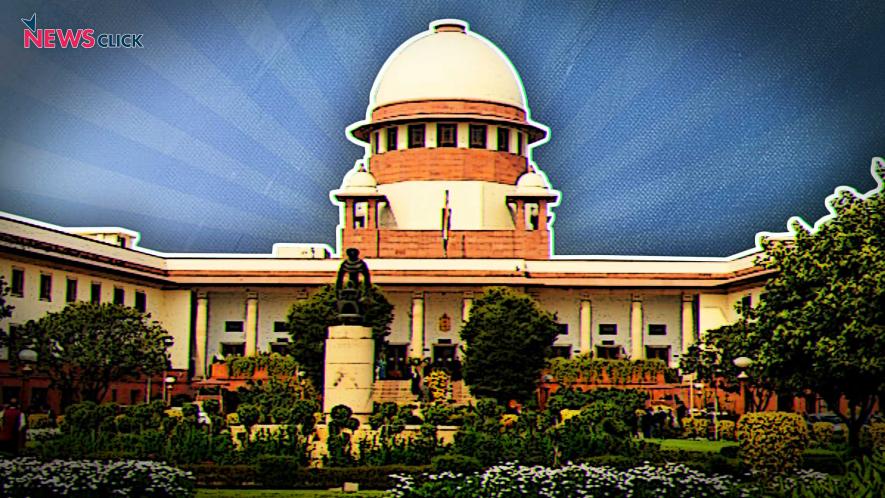SC Admits Petition Seeking Directions Regarding Detention Centres in Assam

New Delhi: The Supreme Court of India has admitted a petition moved by civil rights activist Harsh Mander regarding Foreigner Detention Camps in Assam. At present, there are six detention camps in Assam, all of which are located in district jail premises. As of February this year there were around 800 to 900 declared foreigners and 1,100 to 1,200 convicted foreigners lodged in these camps. Some have accepted that they are foreigners and wish to be deported to their country of origin, however, due to bureaucratic hurdles, they have been in jail for years on end. Another category of persons in the camps are those who have been declared foreigners in ex parte hearings, meaning they were not present when the hearings were conducted. The third and, perhaps, the most aggrieved category consists of people who are ‘stateless’, meaning no State has accepted them as their citizens.
Also Read: Sofiya Khatun, Declared a Foreigner, Set to Walk Free After SC Grants Bail
On September 12, the Supreme Court passed an Order in the matter of Re – Inhuman Conditions in 1382 Prisons wherein the Court issued directions regarding the condition of the detention centres in Assam. It directed the Union Government to prepare the manual of detention centres promptly, indicating that till now these centres had been operating in the absence of any guidelines.
The Court directed the Assam government to expedite the construction of a proper detention centre as an amount for the same had already been sanctioned by the Union Government. It also directed the Assam government to look into the matter of families being separated after being declared foreigners. Since there is only one detention centre for women in Kokrajhar, children up to the age of six years stay with their mothers. After male children attain the age of six years, they would be transferred to stay with their fathers. The Court directed the Assam government to provide the detained persons with cooking gas as until date, all the cooking was done with wood.
Also Read: Indians Allegedly Being Made Foreigners for Money in Assam’s Morigaon
The prayer in Mander’s petition includes several points that have already been dealt with by the September 12 Order of the Supreme Court. The parts of the prayer not covered by the Supreme Court Order are:
-
For the Court to issue directions to ensure that detaining declared foreigners should be the last resort, for a limited period with clear prospects for release. To this effect the detention should be non-punitive and that it should be resorted to only after an assessment of whether there were less restrictive or coercive measures that could have been applied to the individual concerned and which would be effective in the individual case.
-
To issue directions declaring that those who have been determined to be foreigners and held in detention pending their repatriation, be treated as refugees.
-
To issue directions to the State to expedite the deportation of those who have accepted that they are foreigners.
-
To issue directions that those who have been declared foreigners, but whom their country of origin does not accept as nationals of that country, be declared as Stateless persons and be granted long term visa and protections that are afforded to refugees.
-
To issue directions to the Union Government and the government of Assam to ensure that the Indian juvenile justice laws are applied to all children of those deemed to be foreigners, including the children who are detained as well as those who are free while their parents are detained.
Section 3 of the Foreigners Act, 1946 and paragraph 11 of the Foreigners Order, 1948 provide for the state to direct that a foreigner reside in a particular place. However, the White Paper on Foreigners Issue from the Home and Political Department of the Assam government mentioned that the declared foreigners often ‘disappeared’. Hence, it was not possible to constantly keep a tab on their whereabouts. Thus, the government of Assam had resorted to holding them in the detention centres. In this regard, the petition requested that if possible, exemptions could be made for the elderly who are least likely to ‘disappear’.
Perhaps the most troubling aspect of the detention centres is that people have been detained indefinitely due to bureaucratic hurdles in their repatriation. This has resulted in all categories of persons languishing in the centres, such as in the absence of a repatriation treaty with Bangladesh. The present scenario is that India’s Border Security Force (BSF) has to make a representation to Bangladesh’s Border Guards Bangladesh (BGB). After which the BGB forwards the details to the local police, who then verifies whether the person in question is actually from the location stated by the BSF. Only after this is confirmed, is the person repatriated. Thus, in the absence of international agreements, according the people awaiting repatriation the rights of refugees would lessen the indignity they face at present. Whereas expediting the process for repatriation would also shorten the time spent in detention.
The other issue highlighted is that there are people who for all practical purposes are stateless. According them refugee status until they can legally apply for citizenship of whichever country they choose to reside in, can tide over their predicament.
Regarding children, firstly, international humanitarian law prohibits forcefully separating families. However, in the case of Assam, there have been cases where children are declared citizens and their parents are not. Such circumstances should prompt the State to adopt the role of the children’s legal guardian, at least until their parents are repatriated.
Also Read: How Long Do People Need to Live in a Place to Become a Local?
That the foreigners’ issue is an emotive one in Assam, which the Supreme Court has also taken note of, is established. Hence, the Supreme Court had ordered that the National Register of Citizens (NRC) be updated in Assam. The NRC process has trudged on despite claims and counter-claims of bias in its implementation. However, the Foreigners Tribunals have continued to operate independently of the process. The Supreme Court has provided detailed directions in the NRC process to ensure that it is fair. However, there appears to be a lack of oversight in the case of those processed through the Foreigners Tribunals. Thus, a fair and transparent system in this regard is absolutely necessary, even when the person is to be detained.
Get the latest reports & analysis with people's perspective on Protests, movements & deep analytical videos, discussions of the current affairs in your Telegram app. Subscribe to NewsClick's Telegram channel & get Real-Time updates on stories, as they get published on our website.
























